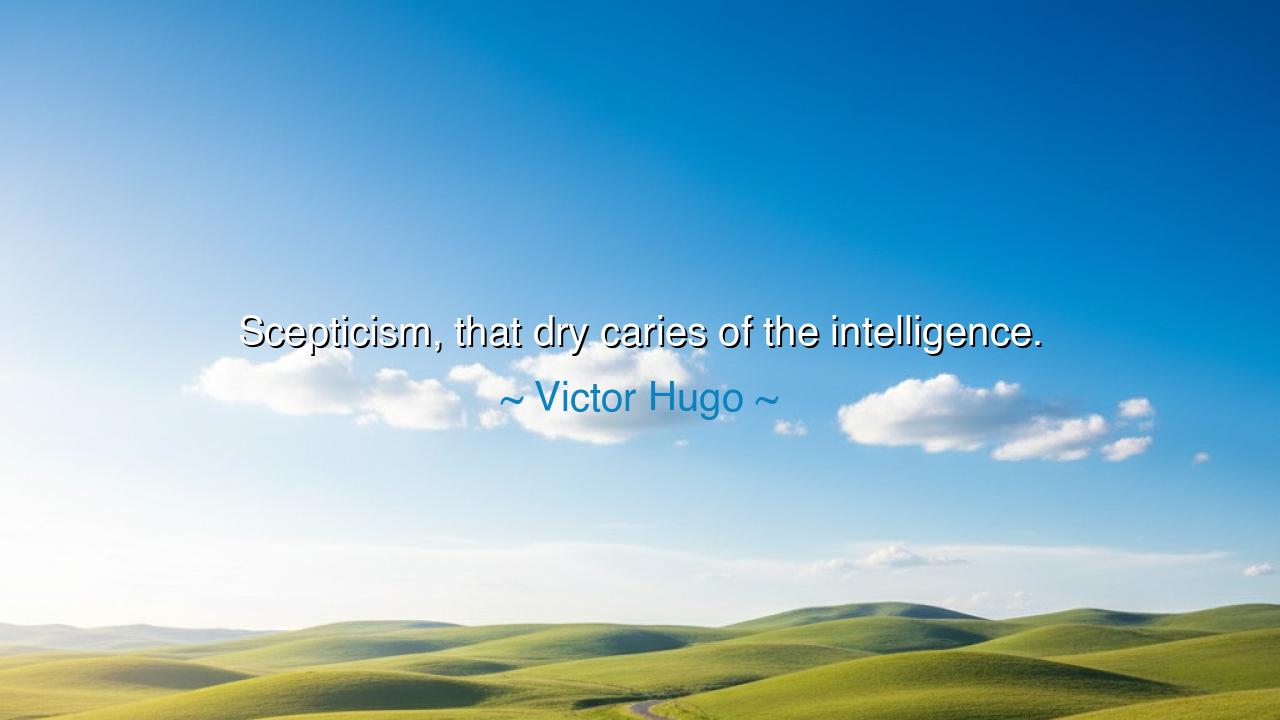
Scepticism, that dry caries of the intelligence.






The words of Victor Hugo, “Scepticism, that dry caries of the intelligence,” strike like a warning carved in stone, solemn and eternal. They speak of the decay not of the body, but of the mind—a rot that spreads quietly through the soul until the light of belief, wonder, and courage is extinguished. In this single phrase, Hugo captures a truth as old as civilization itself: that when faith, imagination, and conviction perish, the human spirit grows brittle, hollow, and lifeless. For scepticism, when it ceases to question with purpose and begins to doubt for its own pleasure, is not wisdom but a sickness—a caries, an erosion of the very substance that makes thought noble and creation possible.
To understand the origin of this quote, one must enter the mind of Victor Hugo, that great prophet of the nineteenth century whose works—Les Misérables, The Hunchback of Notre Dame—throb with moral fervor and divine vision. Hugo lived in an age of revolution and reason, of science and faith locked in combat. He saw the rise of cold rationalism that sought to measure everything and believe in nothing. To him, scepticism was the new plague—a disease of the intelligence that left humanity clever but soulless, capable of invention yet incapable of reverence. His metaphor is precise and haunting: “caries” is the slow decay of bone or tooth, the silent dissolution of strength. So too, he warns, does scepticism corrode the very structure of the intellect, eating away at conviction, beauty, and moral purpose until only the dust of cynicism remains.
This is not to say that Hugo condemned doubt itself. He was too wise for that. Doubt, in its proper form, is the midwife of truth—it questions, probes, and refines. But scepticism, as Hugo names it, is doubt that has turned against life, that mocks the sacred and denies the possible. It is the kind of intelligence that seeks not understanding but superiority, that feeds on irony and distrust until it starves itself of joy. It is a dry caries, he says, because it produces nothing—it dehydrates the imagination, leaving behind the brittle bones of intellect without the living breath of inspiration.
Consider, as an example, the tragedy of the philosopher Voltaire, Hugo’s predecessor in the age of reason. Voltaire’s brilliance illuminated Europe, and his wit shattered superstition, but in his later years, he grew weary and bitter, a man who had mocked so long that he could no longer truly believe in anything. His laughter became dust. The very weapon that made him powerful—his scepticism—left him hollow. He had freed men from fear of priests, but he could not give them the courage to believe in goodness. This is what Hugo calls the caries of the mind: when intelligence forgets its sacred duty to uplift and begins instead to corrode.
Throughout history, this decay has returned in many forms. In the fall of ancient Rome, scepticism crept like rot through the Senate and the streets. The citizens no longer believed in their gods, their laws, or even their virtue. The empire’s heart turned to ash long before its walls fell to the barbarians. So too, in our own time, we see the same sickness in those who mock ideals, who scorn truth as naïve, who call every act of faith foolish. When nothing is sacred, when every belief is suspect, civilization itself loses its foundation. For progress is born not of doubt alone, but of hope—and hope cannot grow in soil poisoned by cynicism.
Hugo’s words, therefore, are a call to balance. To think is noble, to question is just, but to despair of meaning is to betray the gift of intelligence. The mind must not dry itself out in endless dissection; it must remain moist with wonder, with compassion, with trust in beauty. Intelligence without love becomes cruelty; knowledge without humility becomes arrogance. To keep the intellect alive, one must feed it not only with facts but with dreams, for dreams are the rain that keeps thought fertile. The sceptic who denies all mystery makes of his mind a tomb—perfectly rational, perfectly empty.
So, my listener, learn from the wisdom of Victor Hugo. Let your reason be sharp, but let it serve your heart. Do not allow scepticism to wither your faith in goodness, in art, in the unseen bonds that tie humanity together. Believe in something greater than your own cleverness—believe in the power of love, in the dignity of truth, in the possibility of redemption. The world will always tempt you to doubt, but do not mistake disbelief for strength. The truly strong mind is not the one that sneers, but the one that hopes, even in the face of ruin.
For the spirit of civilization depends not on the brilliance of the few, but on the faith of the many. Guard your intelligence from the dry disease of cynicism. Keep it alive with wonder, humility, and purpose. Let your scepticism serve your wisdom, not destroy it. For when belief dies, thought becomes dust; but when thought and faith walk together, they build worlds that endure. And that, dear soul, is how the mind stays whole and radiant—forever free from the dry caries that consumes lesser hearts.






AAdministratorAdministrator
Welcome, honored guests. Please leave a comment, we will respond soon